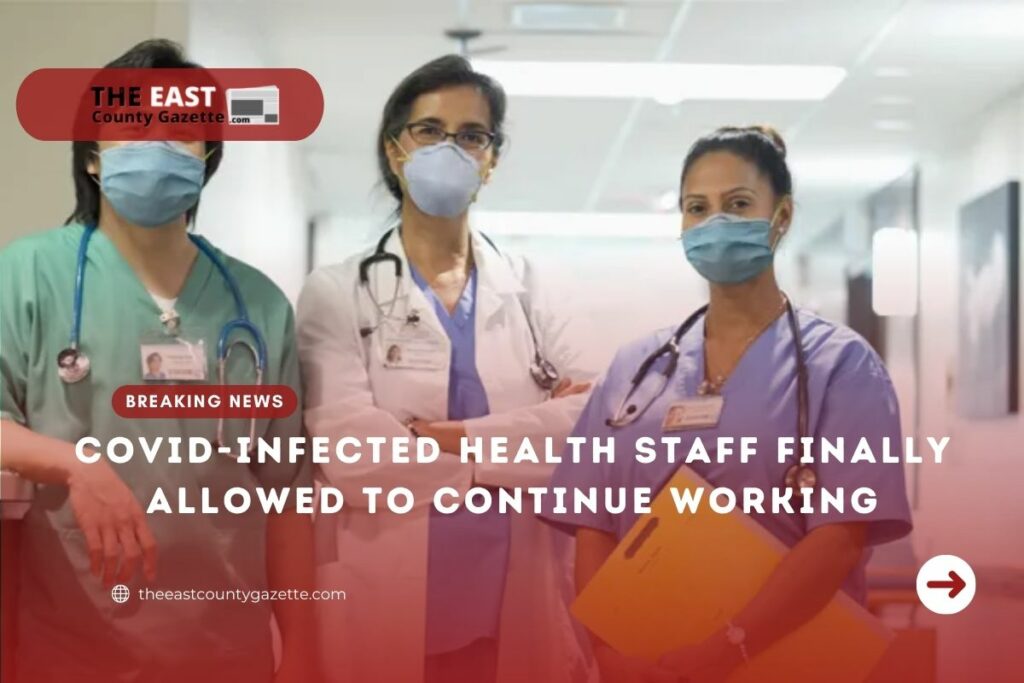Nurses and other workers infected with the Coronavirus in many areas of the U.S. are increasingly allowed to stay on the job if they have mild symptoms or none at all.
According to AP News, this decision is a reaction to omicron’s extreme caseloads and severe staffing shortages at hospitals.
Hospital staff members who test positive but aren’t experiencing symptoms can continue work, California health authorities announced over the weekend.
Similarly, some hospitals in Arizona and Rhode Island have told their employees that mild or no symptoms can be permitted to stay at work.
Over 700,000 new cases of COVID-19 are being reported in the U.S. every day, exceeding the record set a year ago.
About 110,000 Americans are hospitalized with this virus; this is less than half the peak of 124,000 last January.
Because so many employees are out with COVID-19, many hospitals are not only swamped with cases but also severely understaffed.
The omicron variant, however, seems to cause milder illness than the delta variant.
The Centers for Disease Control and Prevention had announced last month that workers with no symptoms can return to work after seven days if their tests are negative, though isolation times can be shortened if staffing is not adequate.
Read More: Stimulus Checks in the amount of $600 and $1,000 Will Be Distributed Within the Next Two Days
The French government announced last week that it would allow workers with mild or no symptoms to continue treating patients instead of isolating them.
Dignity Health, a major hospital operator in Phoenix, sent a memo to employees saying those who felt well enough to work could apply to their managers for permission to resume work. It said it may need to implement the new guidelines in the coming days and weeks at the hospitals in California that belong to Dignity Health.
“We are doing everything we can to ensure our employees can safely return to work while protecting our patients and staff from the transmissibility of COVID-19,” Dignity Health announced.
As a result of “critical staffing shortages,” the Department of Public Health in California issued a new policy that encouraged hospitals to hire outside workers to fill openings.
The department also said that workers who are infected should wear N95 masks and not be assigned to treat other COVID-19-positive patients, according to the release.
“We did not ask for this guidance, and we don’t have any information on whether hospitals will adopt this approach or not,” Jan Emerson-Shea, spokesperson for the California Hospital Association, stated.
“But what we do know is that hospitals are expecting many more patients in the coming days than they’re going to be able to care for with the current resources.”
A number of hospital workers were exposed to the novel virus, which caused them to become ill or take care of their sick relatives.
California Nurses Association, which has 100,000 members, voiced opposition to the decision, warning that it would lead to more infections.
In a statement, Cathy Kennedy, the association’s president, accused Gov. Gavin Newsom of “putting the needs of health care corporations before the safety of patients and workers.”
“We want to care for our patients and see them get better — not potentially infect them.”
A state psychiatric hospital and a rehabilitation center in Rhode Island permitted staff with COVID-19 to work even when they were asymptomatic earlier this month.
Chief Medical Officer Dr. Hany Atallah said workers at Miami’s Jackson Memorial Hospital are not yet at breaking point and are staying away for five days if they test positive.
“We still have to be very careful to prevent spread in the hospital,” he asserted.
As the nurse at Jackson Memorial, Kevin Cho Tipton understands why hospitals are eager to welcome back their employees after five days of isolation. Still, he is concerned about the potential risks, especially for those who are at high risk of infection, such as those who are receiving transplants.
“Yes, omicron is less deadly, but we still don’t know much,” he added.

